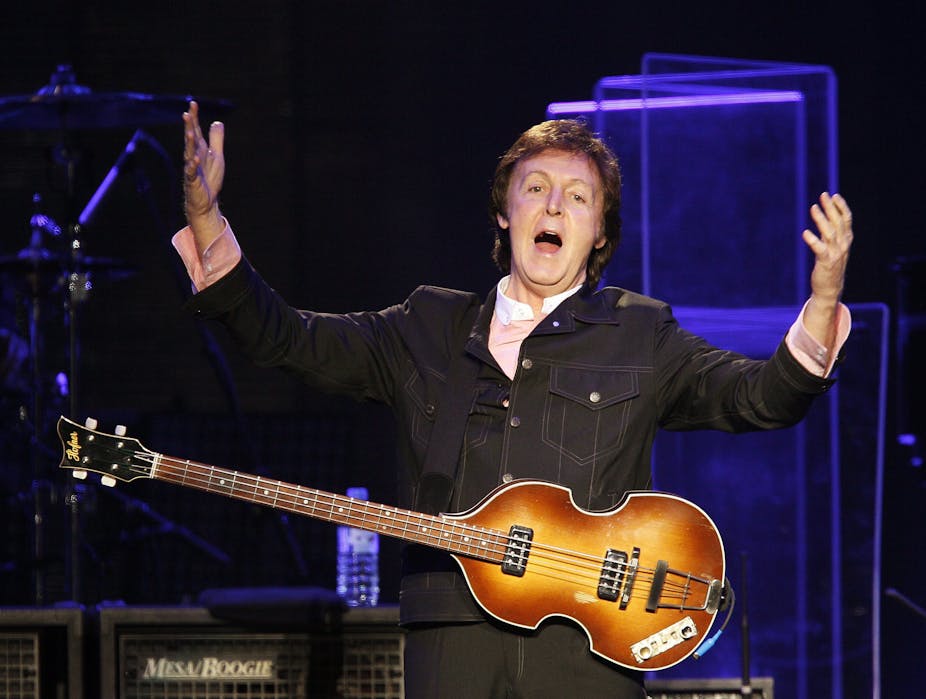Sir Paul McCartney has been making some waves. On New Year’s Eve, Kanye West released a new single, Only One, a collaboration with The Beatles great on keys. On Twitter, Kanye’s fans reacted, wanting to know “who is Paul McCartney?” The broad reaction to this was particularly telling.
Mild panic ensued when the event was expertly exploited by a clever Twitter jokester (below), highlighting the esteem in which Sir Paul is still held by many – and the very real fear some have that he might actually be forgotten one day.
Just as telling were Sir Paul’s views on teaching popular music in universities that gently wafted from a Q&A conducted on Lily Cole’s Impossible website across the digital transom and onto the news feeds of the usual platforms.
Why study pop music?
Sir Paul’s main claim was that the whole idea of the formal study of popular music at the tertiary level was “ridiculous” but flattering.
It wasn’t so much the mere fact of his objections to tertiary study of popular music that brought me up short. These are common enough as to constitute a whole sub-genre of empty rhetoric. It was his justifications for them that caught my attention. These should be of interest to anyone interested in studying popular music.
First and foremost, Sir Paul’s views are rooted in a rich nostalgia for his youth:
We would record four tracks in a day - which is unheard of now - and those four tracks still sell more than most contemporary records. So obviously the system was pretty good. It was very simple, you had to just be very disciplined … we knew we had to play great.
Of course this was probably about 1963, a time when making music was a very different thing from what it is now. Like all musicians, The Beatles faced their own trials. But, with all due respect, these pale in comparison to the challenges facing musicians today.

The Beatles didn’t have to worry about the finer points of their licensing deal with a video-game company or raising the money to record their album from a fickle public rather than Parlophone or EMI. They didn’t have to continually massage their relationship with cranky music blogs or constantly reshape their social media profile to make sure they were trending at the right time.
More importantly, in terms of health, longevity and financial compensation, being a professional musician is simply a lot harder than it was 50 years ago.
The music industry has been a demanding, often corrupt, even exploitative place to work for far longer than YouTube, Sony and Spotify have been bilking musicians out of fair compensation for their music. Even if a university degree does nothing more than convince young musicians to lawyer up from day one, it will have done some good in the world.
Given the obstacles the vast majority of musicians face, a few years of intense study in such diverse fields as history, aesthetics, law, economics, psychology or media, all with a heavy dose critical thinking, would seem be to a prerequisite, not a luxury.
Myth of The Great Artist
Sir Paul also worries that some bright-eyed youth might turn up to university thinking they will somehow emerge in a few years as a songwriting legend.
Sir Paul objects, however, saying “you can’t tell them how to become a Bob Dylan or a John Lennon because, you know, nobody knows how that happens”.
Perhaps Bob Dylan was merely a rhetorical choice, but it was a particularly unfortunate one. Thanks to the extensive annals of Dylanology, there are few artists about whom we know more. We know an especially large amount on “why it happened” with him. It wasn’t rocket science. Dylan studied, read, listened and worked and worked and worked.

In counselling us so, Sir Paul reanimates the many myths of The Great Artist.
Great artists are supposed to spring from the ground through some mysterious process of organic transmogrification. Careful study and critical reflection aren’t a necessary part of an aesthetic education. The hoary old stereotype is that too much study ruins “the magic”, says Sir Paul:
[W]e never studied anything, we just loved our popular music: Elvis, Chuck Berry, Little Richard, Fats Domino etc. And it wasn’t a case of “studying” it. I think for us, we’d have felt it would have ruined it to study it. We wanted to make our own minds up just by listening to it. So our study was listening.
It is surprising that Sir Paul, the co-founder of the Liverpool Institute for the Performing Arts, could appear to be so unclear about what people who study music in university actually do.
Careful, close, critical and engaged listening is right at the heart of it. Contrary to the numerous prognostications of doom about an entire generation supposedly unable to listen anymore, there are plenty of places where close listening is both demanded and rewarded. Many of these places are in universities.
The simple fact is that a tough, challenging university degree can do the same thing for a musician that it can for a barrister or a surgeon. Do you want your surgeon to worry that too much study might ruin the magic of your angioplasty?
So why are musicians still routinely spun such fantasies by their elders? Any education worthy of the name, whatever the source, makes you think. It challenges your preconceptions. It forces you to confront the world as it is and helps you to imagine how you’d like it to be.
Sir Paul’s status as soothsayer and pop icon is clearly getting a little worn. So are some of his attitudes. Instead of fear, magic or nostalgia, maybe we can try to let knowledge guide our understanding of the place popular music has in the world.

